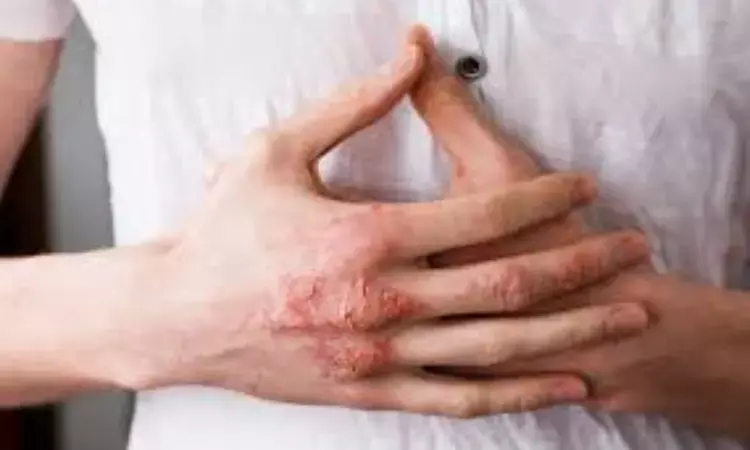- Home
- Medical news & Guidelines
- Anesthesiology
- Cardiology and CTVS
- Critical Care
- Dentistry
- Dermatology
- Diabetes and Endocrinology
- ENT
- Gastroenterology
- Medicine
- Nephrology
- Neurology
- Obstretics-Gynaecology
- Oncology
- Ophthalmology
- Orthopaedics
- Pediatrics-Neonatology
- Psychiatry
- Pulmonology
- Radiology
- Surgery
- Urology
- Laboratory Medicine
- Diet
- Nursing
- Paramedical
- Physiotherapy
- Health news
- Fact Check
- Bone Health Fact Check
- Brain Health Fact Check
- Cancer Related Fact Check
- Child Care Fact Check
- Dental and oral health fact check
- Diabetes and metabolic health fact check
- Diet and Nutrition Fact Check
- Eye and ENT Care Fact Check
- Fitness fact check
- Gut health fact check
- Heart health fact check
- Kidney health fact check
- Medical education fact check
- Men's health fact check
- Respiratory fact check
- Skin and hair care fact check
- Vaccine and Immunization fact check
- Women's health fact check
- AYUSH
- State News
- Andaman and Nicobar Islands
- Andhra Pradesh
- Arunachal Pradesh
- Assam
- Bihar
- Chandigarh
- Chattisgarh
- Dadra and Nagar Haveli
- Daman and Diu
- Delhi
- Goa
- Gujarat
- Haryana
- Himachal Pradesh
- Jammu & Kashmir
- Jharkhand
- Karnataka
- Kerala
- Ladakh
- Lakshadweep
- Madhya Pradesh
- Maharashtra
- Manipur
- Meghalaya
- Mizoram
- Nagaland
- Odisha
- Puducherry
- Punjab
- Rajasthan
- Sikkim
- Tamil Nadu
- Telangana
- Tripura
- Uttar Pradesh
- Uttrakhand
- West Bengal
- Medical Education
- Industry
Sulfur Cream Matches Triamcinolone in Treating Hand Eczema: Study

Hand eczema (HE) is a common condition with diverse causes and symptoms. Various treatment options exist, including topical creams.
Hand eczema presents with symptoms such as itching, dryness, burning sensation, and erythema, impacting patients' quality of life. Triamcinolone cream is a standard treatment, but sulfur cream's effectiveness remains uncertain. In this study, researchers compared the efficacy of triamcinolone 0.1% cream and sulfur 2% cream in treating Hand Eczema. Researchers have found that topical sulfur cream (2.0%) is equally effective as triamcinolone (0.1%) cream in treating Hand eczema.
This study has been published in the Journal Of Cosmetic Dermatology by Asilian and colleagues.
Researchers conducted a randomized, triple-blind clinical trial involving 70 patients with HE, treating both their right and left hands. Participants received either triamcinolone 0.1% cream or sulfur 2.0% cream twice daily for 4 weeks, with a 4-week follow-up period. Hand Eczema Severity Index (HECSI) and symptom scores were collected and compared between the two treatment groups.
• In the study involving 70 patients with hand eczema (HE), both triamcinolone and sulfur creams demonstrated significant efficacy in reducing Hand Eczema Severity Index (HECSI) scores.
• As well as alleviating itching, dryness, burning sensation, and erythema.
• These therapeutic benefits were sustained for at least 4 weeks post-treatment cessation, indicating potential long-term effects.
• Importantly, neither cream elicited prominent adverse reactions, suggesting their safety profiles are favorable for treating HE.
The study concludes that topical sulfur cream (2.0%) is equally effective as triamcinolone (0.1%) cream in treating Hand eczema, with no significant adverse reactions noted. This finding provides patients and clinicians with another viable treatment option for HE.
Reference:
Dr Riya Dave has completed dentistry from Gujarat University in 2022. She is a dentist and accomplished medical and scientific writer known for her commitment to bridging the gap between clinical expertise and accessible healthcare information. She has been actively involved in writing blogs related to health and wellness.
Dr Kamal Kant Kohli-MBBS, DTCD- a chest specialist with more than 30 years of practice and a flair for writing clinical articles, Dr Kamal Kant Kohli joined Medical Dialogues as a Chief Editor of Medical News. Besides writing articles, as an editor, he proofreads and verifies all the medical content published on Medical Dialogues including those coming from journals, studies,medical conferences,guidelines etc. Email: drkohli@medicaldialogues.in. Contact no. 011-43720751


